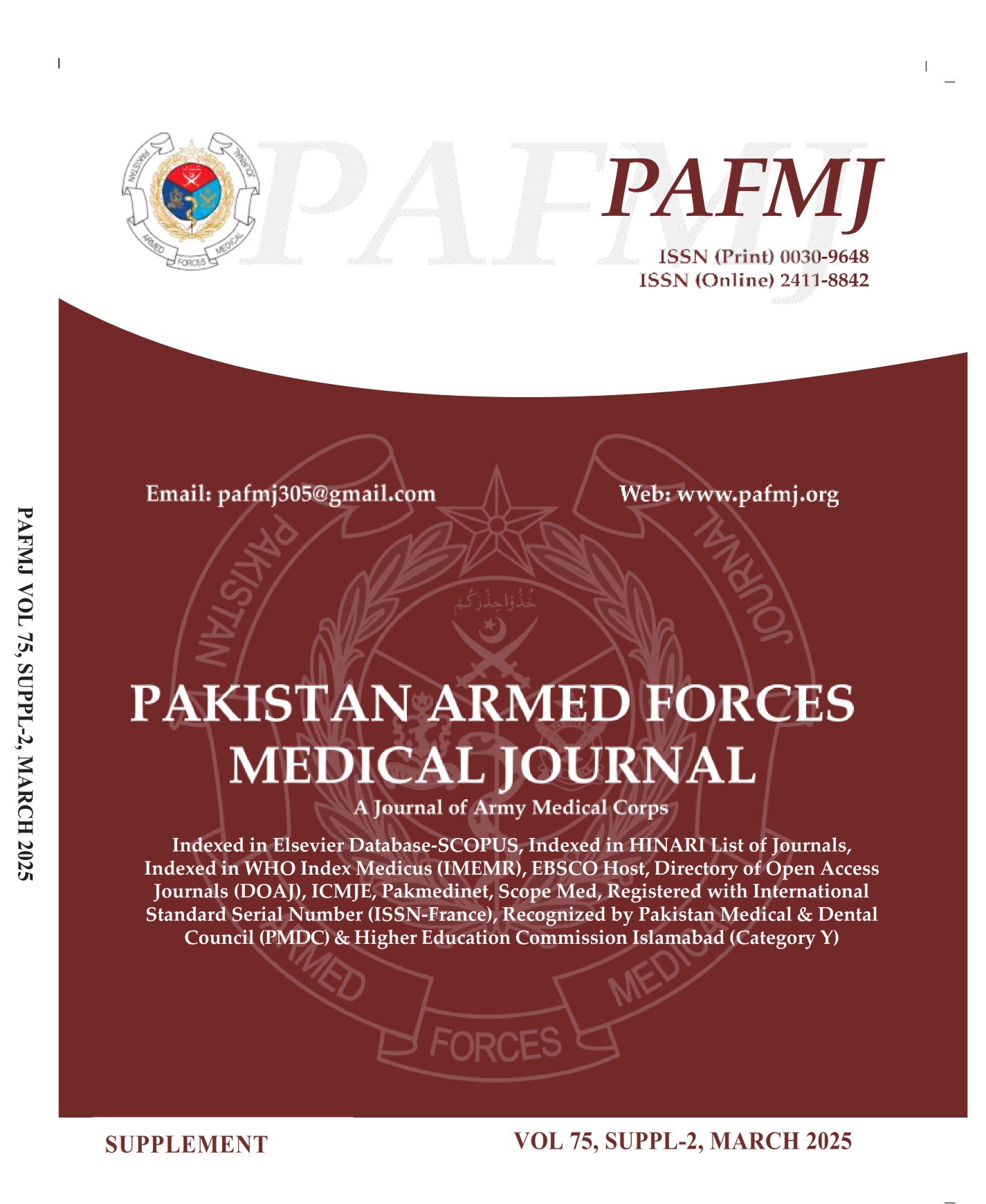Inferring Association of Celiac Disease and Helicobacter Pylori Infection in Children from Rawalpindi, Pakistan: a Single-Center Experience
DOI:
https://doi.org/10.51253/pafmj.v75iSUPPL-2.7246Keywords:
Celiac disease, Hemoglobin, Helicobacter pyloriAbstract
Objective: To assess the relationship between Helicobacter pylori infection and gluten-sensitive enteropathy, commonly known as Celiac disease in children.
Study Design: Cross-sectional study.
Place and Duration of Study: Combined Military Hospital, Rawalpindi Pakistan, from Aug 2020 to Feb 2021.
Methodology: A total of 94 participants in the age range of 3–13 years were randomly distributed in Group–A (Coeliac Disease Patients) and n Group–B (Non-Coeliac Disease Patients). Frequency of Helicobacter pylori in children with Celiac disease versus non-celiac disease correlated. Tissue transglutaminase (tTG) IgA antibody assay (tTG levels >18 U/mL) and Helicobacter pylori prevalence were recorded.
Results: In Group A and Group B the mean age was 6.43±2.48 (3-13years) and 5.5±1.6 (6–9 years) respectively, with the male preponderance of 54(57.4%) compared to 40(42.6%) in females. Celiac disease patients with Helicobacter pylori infection were only 8(14.3%), with 4(7.1%) being males and 4(7.1%) being females. Level of tissue transglutaminase (tTG) IgA antibody was less than 10 in controls.
Conclusion: In conclusion, Helicobacter pylori infection was recorded to be lower in pediatric patients who presented with celiac disease hence proved to have an inversely proportional relationship.
Downloads
References
Agin M, Batun I, Ozdemir S, Doran F, Tumgor G. Prevalence of Helicobacter pylori in Turkish children with celiac disease and its effect on clinical, histopathological, and laboratory parameters. Arch Med Sci AMS 2019; 15(2): 1475.
https://doi.org/10.5114/aoms.2019.83699
Lebwohl B, Sanders DS, Green PHR. Coeliac disease. Lancet 2018; 391(1): 70–81.
https://doi.org/10.1016/S0140-6736(17)31796-8
Konturek PC, Karczewska E, Dieterich W, Hahn EG, Schuppan D. Increased prevalence of Helicobacter pylori infection in patients with celiac disease. Am J Gastroenterol 2000; 95(1): 3682.
https://doi.org/10.1111/j.1572-0241.2000.03421
Kumar S, Metz DC, Kaplan DE, Goldberg DS. Seroprevalence of H. pylori infection in a national cohort of veterans with non-cardia gastric adenocarcinoma. Clin. Gastroenterol. Hepatol 2020; 18(5): 1235.
Nejad MR, Rostami K, Yamaoka Y, Mashayekhi R, Molaei M, Dabiri H, et al. Clinical and histological presentation of Helicobacter pylori and gluten-related gastroenteropathy. Arch. Iran. Med 2011; 14(2): 115.
Nelsen DA. Gluten-sensitive enteropathy (celiac disease): more common than you think. AFP 2002; 66(12): 2259.
Olszewska-Szopa M, Wróbel T. Gastrointestinal non-Hodgkin lymphomas. Adv Clin Exp Med 2019; 28(8): 1119-1124
Lebwohl B, Rubio-Tapia A. Epidemiology, Presentation, and Diagnosis of Celiac Disease. Gastroenterology 2021; 160(1): 63–75. https://doi.org/10.1053/j.gastro.2020.06.098
Vlăduţ C, Ciocîrlan M, Costache RS, Jinga M, Balaban VD, Costache DO, et al. Is mucosa-associated lymphoid tissue lymphoma an infectious disease? Role of Helicobacter pylori and eradication antibiotic therapy. Exp. Ther. Med 2020; 20(4): 3546-3553.
Wu Y, Murray GK, Byrne EM, Sidorenko J, Visscher PM, Wray NR, et al. GWAS of peptic ulcer disease implicates Helicobacter pylori infection, other gastrointestinal disorders, and depression. Nat. Commun 2021; 12(1): 1-7.
Singh P, Arora A, Strand TA, Leffler DA, Catassi C, Green PH, et al. Global Prevalence of Celiac Disease: Systematic Review and Meta-analysis. Clin Gastroenterol Hepatol 2018; 16(6): 823-836.e2. https://doi.org/10.1016/j.cgh.2017.06.037
Luzza F, Mancuso M, Imeneo M, Mesuraca L, Contaldo A, Giancotti L, et al. Helicobacter pylori infection in children with celiac disease: prevalence and clinicopathologic features. J Pediatr Gastroenterol Nutr 1999; 28(1): 143–146.
https://doi.org/10.1097/00005176-199902000-00009
Amlashi FI, Norouzi Z, Sohrabi A, Shirzad-Aski H, Norouzi A, Ashkbari A, et al. A systematic review and meta-analysis for the association of Helicobacter pylori colonization and celiac disease. PloS one 2021; 16(3): e0241156.
Lebwohl B, Blaser MJ, Ludvigsson JF, Green PHR, Rundle A, Sonnenberg A, et al. Decreased risk of celiac disease in patients with Helicobacter pylori colonization. Am J Epidemiol 2013(2); 178: 1721–1730. https://doi.org/10.1093/aje/kwt234
Jozefczuk J, Bancerz B, Walkowiak M, Glapa A, Nowak J, Piescikowska J, et al. Prevalence of Helicobacter pylori infection in pediatric celiac disease. Eur Rev Med Pharmacol Sci. 2015; 6(2): 3-7.
Narang M, Puri AS, Sachdeva S, Singh J, Kumar A, Saran RK, et al. Celiac disease and Helicobacter pylori infection in children: Is there any Association? J Gastroenterol Hepatol 2017(2); 32: 1178–1182. https://doi.org/10.1111/jgh.13654
Aydogdu S, Cakir M, Ali Yuksekkaya H, Tumgor G, Baran M, Arikan C, et al. Helicobacter pylori infection in children with celiac disease. Scand J Gastroenterol 2008; 43(1): 1088–1093.
https://doi.org/10.1080/00365520802101846
Maxim R, Pleşa A, Stanciu C, Gîrleanu I, Moraru E, Trifan A. Helicobacter pylori prevalence and risk factors among children with celiac disease. Turk J Gastroenterol 2019; 30(3): 284.
Bayrak NA, Tutar E, Volkan B, Sahin Akkelle B, Polat E, Kutluk G, et al. Helicobacter pylori infection in children with celiac disease: Multicenter, cross‐sectional study. Helicobacter 2020; 25(1): e12691. https://doi.org/10.1111/hel.12691
Downloads
Published
Issue
Section
License
Copyright (c) 2025 Muzzammal Ghafoor, Farooq Ikram, Hina Riaz, Junaid Bashir, Atif Aziz, Muhammad Waleed Babar

This work is licensed under a Creative Commons Attribution-NonCommercial 4.0 International License.















